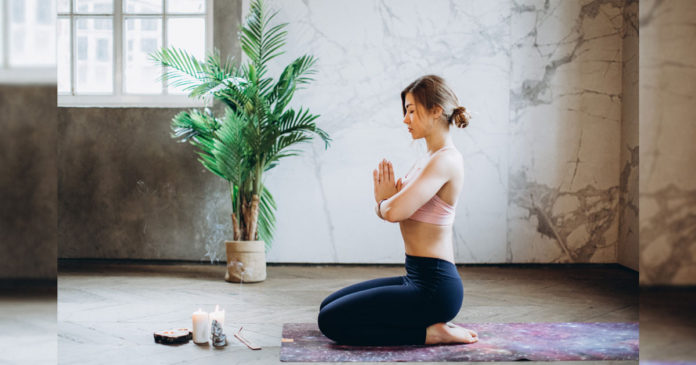Throughout history, numerous civilizations and faiths have embraced prayer and meditation as spiritual activities. While they have certain shared characteristics, they also have distinguishing features that differentiate them distinctive. In this part, we will look at the meanings of prayer vs meditation, as well as how they are used in various circumstances.
Prayer vs meditation is a way of connection with a heavenly entity or higher power. It is often used to express appreciation, seek direction, or request favors. Prayer may take numerous forms, including chanting particular prayers or mantras, sitting in silence, or participating in social rituals. It is strongly founded in religion and belief traditions and is used to connect with the divine.
Meditation, on the other hand, is a practice that focuses on developing attention and inner awareness. It entails conditioning the mind to reach a state of calm, clarity, and heightened awareness. Meditation, as opposed to prayer, which often includes outward contact with a higher power, stresses introspective introspection and self-discovery. Individuals may improve their mental clarity and psychological well-being by using methods such as breathing awareness or guided visualization.
Individuals seeking spiritual or personal development might benefit from prayer vs meditation. They allow for contemplation, stress reduction, greater attention, higher emotional resilience, and self-awareness. These activities are becoming increasingly popular outside of religious settings as more individuals understand their ability to boost general well-being.
We will go further into the principles and procedures of each practice, as well as their distinct advantages within various cultural traditions. This article attempts to give essential insights on the transforming potential of prayer vs meditation in our lives, regardless if you are a beginner to these activities or want to improve your knowledge.
The Purpose and Process of Prayer
Prayer is a very personal and spiritual exercise that takes on varied meanings for different faiths and belief systems. It is used to connect with a greater power, seek direction, express thanks, find consolation, and find solace in times of suffering.
People participate in many styles of prayer based on their morals and aims. These may include adoration and praise prayers, thankfulness and appreciation prayers, forgiveness and repentance prayers, guidance and wisdom prayers, healing and protection prayers, and so forth.
The advantages of prayer vs meditation go beyond spiritual or religious situations. According to research, prayer may improve mental health by lowering stress and fostering emotions of peace and relaxation. It has also been shown to improve emotions of closeness with people and develop a sense of meaning in life.
Individuals who want clarity or guidance in making significant choices or managing difficult circumstances often pray for guidance. People who pray frequently find solace in knowing they are not isolated in their troubles and that they may turn to something greater for help.
Many people turn to prayer for comfort during times of adversity or sadness. Individuals may freely express their feelings while finding strength via their religion or spirituality when they pray. It allows one to release fears or responsibilities to a greater being, providing consolation that one is not lonely during tough times.
Overall, the objective of prayer vs meditation varies from individual to person, but it often entails seeking a connection to something bigger than oneself while also finding inner serenity and strength. Setting up devoted time for thinking, expressing ideas or aspirations via words or meditation-like activities, and having an open heart and mind are all part of the process.
The Purpose and Process of Meditation
Meditation is a centuries-old discipline that is gaining appeal in today’s fast-paced society. It entails concentrating one’s thoughts and obtaining mental clarity and tranquility. Meditation’s objective differs from individual to person, although it typically attempts to enhance calmness, self-awareness, and peacefulness within.
There are many styles of contemplation, each one having its own set of practices and goals. One of the most popular types of meditation is mindfulness meditation, which entails paying awareness to the current situation without judgment. This style of meditation assists people in being more conscious of their thoughts, feelings and sensations.
Another common kind is transcendental meditation, which includes using a mantra or repetitive sound to create a profound level of relaxation and beyond. This approach is frequently employed to alleviate tension and anxiety.
Regular meditation practice has several advantages. According to research, it may help decrease stress, improve attention and concentration, improve emotional well-being, increase creativity, raise self-awareness, and even benefit physical health by decreasing blood pressure and increasing the immune system.
Finding a quiet area where one may sit properly in a relaxed stance is usually the first step in the meditation practice. The person then concentrates their focus on their respiration or a single item or mantra, letting ideas pass by without affiliation or judgment.
It’s crucial to remember that meditation isn’t about entirely cleansing the mind. But rather about watching ideas as they occur without getting caught within them. Individuals may acquire a better feeling of inner peace and develop mindfulness abilities that transcend beyond their traditional sitting exercise into their everyday life with consistent practice.
The Key Differences Between Prayer vs Meditation
Prayer vs meditation entail interacting with a higher force or inner self, yet there are significant variations between the two.
The aim and strategy are two key contrasts. Prayer is often associated with a particular goal or request, in which humans speak with an invisible being to seek direction, beg for assistance, or show appreciation. It is an ongoing practice in which certain words or phrases are said or thought.
Meditation, on the contrary hand, is more about yielding and letting go. It is a method of calming one’s mind and allowing ideas to glide through without attachment. Meditation seeks to build awareness and an understanding of the moment at hand rather than particular objectives or demands.
Prayer usually involves reaching out to things outside of oneself for assistance or direction. It may be done within theological or spiritual contexts and often incorporates rituals, the Scriptures, or prayers unique to distinct belief systems.
Meditating, on the other conjunction, places an emphasis on introspection and inner investigation. It may take several forms, including meditation on mindfulness, loving-kindness meditation, and transcendental meditation. The emphasis is on developing a strong feeling of presence and connecting with one’s own inner knowledge.
While prayer may include communicating with an external higher power, meditation emphasizes engaging with a person’s inner being and tapping into intrinsic knowledge and clarity.
In conclusion, prayer is more deliberate and centered on seeking external help or direction from a higher authority. Meditation focuses on yielding to the present time and developing a deeper relationship with self. Prayer vs meditation have distinct advantages and may complement one another in personal development trips.
Benefits of Prayer: How it Impacts Mental Well-being and Spiritual Connection
Prayer has been practiced by numerous civilizations and faiths throughout history. Prayer has been discovered to offer several advantages for mental wellness and spiritual connection apart from its spiritual meaning.
One of the most significant mental health advantages of prayer vs meditation is its potential to bring peace and comfort during difficult situations. Prayer may provide a feeling of serenity, lowering stress and anxiety levels. It provides a safe area for people to share their feelings, emotions, and problems, bringing a sense of pleasure and support.
Prayer may also help build thankfulness. Individuals are urged to concentrate on the good parts of their life by expressing thankfulness in their prayers. This act of gratitude may lead to a better feeling of appreciation and satisfaction.
Prayer vs meditation may also be used to build or deepen one’s spiritual connection. It allows people to connect with a greater power or divine presence, according to their beliefs. This connection may provide direction, purpose, and a feeling of belonging.
It is crucial to remember that the effects of prayer vs meditation may differ based on the individual’s beliefs as well as private experiences. However, studies show that adopting daily meditation into one’s life may improve one’s mental health and stimulate spiritual development.
Finally, prayer vs meditation not only serves an important part in spiritual activities. But it also has considerable mental health advantages. The act of prayer has the ability to favorably improve one’s entire well-being, from finding consolation during tough times to nurturing appreciation and establishing spiritual connection.
Benefits of Meditation: Enhancing Mindfulness and Promoting Inner Peace
Meditation has received a lot of attention over the past few years for its multiple mental health advantages. Meditation has been shown to lower stress, improve awareness, and promote inner calm when practiced on a regular basis.
One of the most important advantages of meditating is its capacity to alleviate stress. Stress has become a typical occurrence for many people in today’s fast-paced environment. Regular meditation, on the other hand, has been found in studies to help decrease levels of cortisol (a stress hormone) and produce a feeling of peace and relaxation.
Another significant component of meditating is its ability to increase self-awareness via mindfulness practices. Individuals may get a better knowledge of their own moods, behaviors, and cognitive patterns by concentrating their focus on the current moment and monitoring thoughts and feelings without judgment. This increased self-awareness may lead to greater emotional control and decision-making abilities.
Furthermore, consistent meditation practice may improve awareness – the feeling of being completely present in the present moment. Mindfulness helps people to have a more profound experience of life. It is paying by attentively to their perceptions, thoughts, and emotions without being distracted by judgments or distractions. Increased mindfulness may lead to a better appreciation for life’s basic joys as well as a decrease in worry or rumination.
In conclusion, adopting daily meditation into one’s practice provides a plethora of mental health advantages. This ancient practice enables people with skills to better their well-being and achieve inner peace among the pressures of everyday life, from stress reduction to increasing self-awareness via mindfulness practices.
Conclusion: Choosing the Right Practice for Your Spiritual Journey
Finally, deciding on prayer vs meditation for you is a very personal choice. However, it is essential to think about the mental health advantages of meditation. Meditation has been demonstrated to relieve stress and increase general well-being when practiced on a regular basis.
You may increase self-awareness and acquire a better knowledge of yourself by adding mindfulness practices into your regular routine. This may result in enhanced emotional control, more clarity, and a deeper feeling of inner calm.
It is worth mentioning that several types of prayer vs meditation techniques are accessible. It may be beneficial to experiment with several strategies to see which ones work best for you. Finding an activity that fits your needs and interests. Whether it’s concentrated breathing techniques, guided visuals, or scan-based meditations, is essential.
Remember that beginning on the path of spirituality does not imply attaining perfection or arriving at a certain destination. It is about accepting the journey of self-discovery and progress. You may begin this path with increased awareness as well as empathy for yourself as well as others if you include mindfulness and meditation into your life.
Finally, the practice you choose between prayer vs meditation will be determined by your own objectives, tastes, and beliefs. As you follow your own particular spiritual journey, trust yourself to uncover which practices work best for you.












